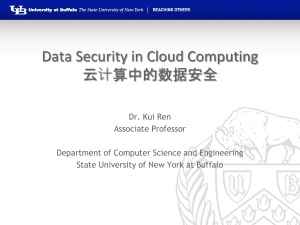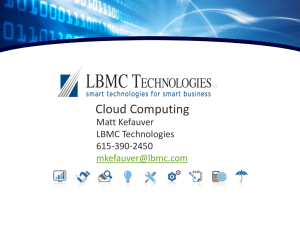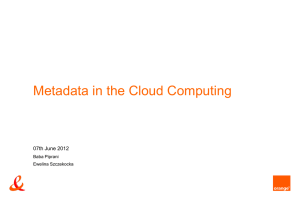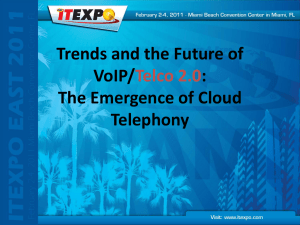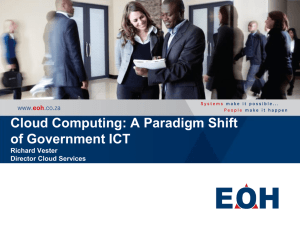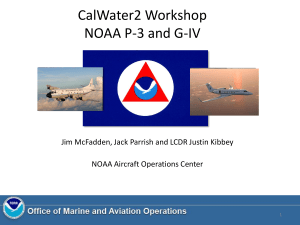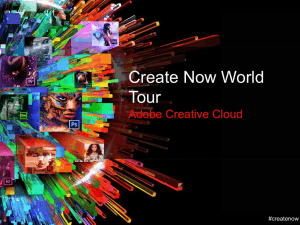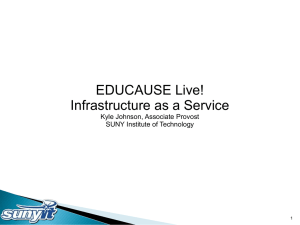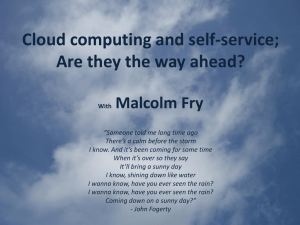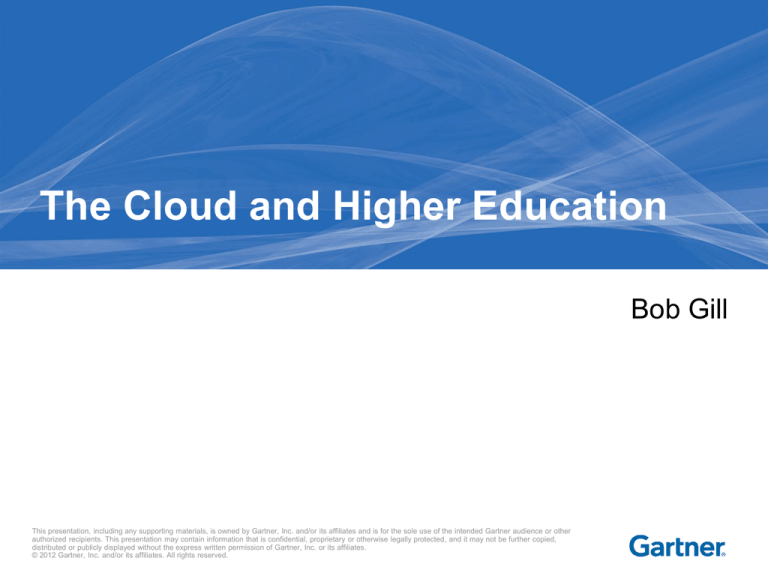
The Cloud and Higher Education
Bob Gill
This presentation, including any supporting materials, is owned by Gartner, Inc. and/or its affiliates and is for the sole use of the intended Gartner audience or other
authorized recipients. This presentation may contain information that is confidential, proprietary or otherwise legally protected, and it may not be further copied,
distributed or publicly displayed without the express written permission of Gartner, Inc. or its affiliates.
© 2012 Gartner, Inc. and/or its affiliates. All rights reserved.
Moving Beyond Simply Turbo charging
Through “Digitalization”
• Not simply “the same, but faster or more
efficiently”:
- Analog leaders are executives who apply IT
to create online versions of current
institutional "business" models.
- Digital leaders are technology-savvy
executives who create new value and
funding using digital technology to build new
digital institutional "business" models that
transform value, funding and performance
Sustaining / Digitizing vs.
Disruption / Digitalization In Higher Education
•Supporting the Main
Missions
of the Institution
in the Era of ERP?
Support
Processes
(Admin.)
Supporting the Main Missions
of the Institution
in Era of Consumerization!
Educate
Research
Sustaining/
Digitizing
Educate
Disruptive/
Digitalizing
Total
Recall
Automation/
Virtualization of
existing
capabilities
Augmented
Collaboration
Adaptive
Learning
Instant
Visualization
?
Areas of opportunities
in the near future!
The focus today …
2
!
IT Market Clock For Higher Education
3
IT Hype Cycle For Education
expectations
BYOD Strategy
Social Software Standards
Gamification
Adaptive Learning
Digital Preservation of Research Data
COBIT
User-Centric IAM
Learning Stack
MOOC
Mobile-Learning Low-Range/Midrange Handsets
Student Enrollment CRM
Web-Based Office Productivity Suites
Organization-Centric IAM
Cloud HPC/CaaS
Mashups
Open-Source Middleware Suites
Open-Source SIS
Social Media in Education
EA Frameworks
Big Data
Open-Source
E-Portfolios
Social Learning Platform for Education
Service-Oriented
Financials
SIS International Data
Architecture
Mobile-Learning Smartphones
802.11n
Interoperability Standards
Self-Publishing
Open-Source Portals
Affective Computing
ITIL
Game Consoles as Media Hubs
BPO
Intellectual Property Rights and
Campus App Store
Royalties Management Software
E-Textbook
Unified Communications and Collaboration
Quantum Computing
IT Infrastructure Utility
Cloud Email for
Enterprise Architecture
Staff and Faculty
SaaS
Administration Applications
Student Retention CRM
Hosted Virtual Desktops
Media
Tablets
Virtual Environments/Virtual Worlds
Emergency/Mass Notification Services
Open-Source Learning Repositories
As of July 2012
Lecture Capture and Retrieval Tools
Wireless aaS
Technology
Trigger
Peak of
Inflated
Expectations
Trough of
Disillusionment
Slope of Enlightenment
Plateau of
Productivity
time
Plateau will be reached in:
less than 2 years
2 to 5 years
5 to 10 years
4
more than 10 years
obsolete
before plateau
The Cloud Deployment Conundrum
• While networked virtualization has paved the way for private
cloud, many business users and consumers have bypassed
IT and proceeded directly to public cloud resources
Public
Cloud
IT
Server
Virtualization
Distributed
Virtualization
Private
Cloud
• Capital expense
elimination
• Consolidation
• Capital
expense
• Flexibility
and speed
• Operational
expense,
automation
• Less downtime
• Self-serve agility
• Standardization
• IT as a business
• Usage metering
• Increased
flexibility
(up and down)
• Innovative
application
services
How Can IT Remain Strategic? By Facilitating the Selection and
Adoption of Internal and Externally-sourced Cloud Resources
Film Forecaster
PaaS
Cloud
Service Broker
(CSB)*
Providers are developing
offerings across multiple
segments, making market
segments increasingly
interconnected
Business Proc. Serv.
Information Services
IaaS
Application Services
App. Infrastructure Services
vCloud
System Infrastructure Services
Cloud Enablement
Cloud Brokerage
BPaaS
SaaS
Mgmt. and Security
Cloud has a significant
impact on every aspect of
IT and how users access
applications, information,
and business services
Which _aaS Model Is Most Attractive?
It Depends on Who You Are
RoW
Viewpoint
Enterprise IT
Viewpoint
Platform as
a Service
The rest of
the world
sees the
cloud as a
consumer
service
platform
Infrastructure
as a Service
SaaS
Platform as a
Service
Private
Cloud
Private Cloud
Enterprise
IT sees
the cloud as
an extension
of its
technology
strategy
BPaaS
Infrastructure
as a Service
Public Cloud
SaaS
Public Cloud
BPaaS
Why Are Hybrid Clouds the Inevitable
Future?
Private
Cloud
• Self-service
• Service
standardization
• IT as a business
• Usage-based
metering
Hybrid
Cloud
• Blend of capital and
operational cost
• Control
• Economics
• Architectural
flexibility
Public
Cloud
• No capital cost
• Total usage
flexibility
• Low barrier
to entry
Hybrid Cloud Adoption May Progress
From the Inside Out …
Stage 1:
Stage 2:
Server
Distributed
Virtualization Virtualization
• Consolidation
• Capital
expense
• Flexibility
and speed
• Operational
expense,
automation
• Less
downtime
Stage 3:
Private
Cloud
Stage 4:
Public
Cloud
• Self-serve
• Capital
agility
expense
• Standardization elimination
• Increased
• IT as a
flexibility
business
(up and
• Usage metering down)
Stage 5:
Hybrid
Cloud
• Cost for
steady-state
loads
• Flexibility for
peak loads
… Or From the Outside In
Stage 2:
In-house data center,
colocation, managed
services, and so on.
Interconnection
Stage 1:
Public
IaaS
Business
Seeks to
leverage
existing IT
assets!
Public Cloud Is Not ALWAYS the Most
Cost-effective Option
Public IaaS
Monthly Cost
Capacity Meets
Demand
Opportunity Cost
Or Opportunity Lost!
Private IaaS
Wasted
CapEx
Cost is Capped
but
so is the
Capacity!
Work Being Done
Economics May Favor Private Cloud For
Inelastic Predictable Loads, So …
"Buy the Base, Rent the Spike …"
Intermittent
Peaks Don't
Warrant
Overbuilding
Economics
Favor Fixed
Capacity
… Which Favors a Hybrid Model!
Will You Be Able to Leverage the Expanding
Choices in the Education Ecosystem?
Does your organization have a documented IT
sourcing strategy?
Don't know
7%
Yes
22%
No
71%
N = 119
Base: Organization currently uses internal IT sourcing
Recommendations:
Delivering on The Institutional Mission
• How do you strategize when your competition goes from
analog to digital?
- Acquire a language for change that enables you to communicate the
value of IT
- Through visualizing the impact of Digitalization and Disruptive Innovation
on the education ecosystem in general and your institutional business
model in particular.
• How do you execute when every commitment ties down
resources?
Disruptive Innovation
Exostructure
Services
Digitalization
- Build Flexibility For The Future
- Through a sourcing strategy based on leveraging your Service
catalogue and the Exostructure
Recommended Gartner Research
The Expanding Education Ecosystem: A World of
Choice
Jan-Martin Lowendahl, Bill Rust (G001931515)
Digitalizing the Business
Mark P. McDonald Andy Rowsell-Jones (G00233511)
Predicts 2012:
Technology Fuels Education on the Move
Bill Rust and others (G00227430)
Agenda for Higher Education, 2012
Jan-Martin Lowendahl, others (G00228835)
Cool Vendors in Education, 2012
Jan-Martin Lowendahl, others (G00232015)
Higher Education Sourcing Survey, 2012: Increasing
Interest in OSS and Cloud
Jan-Martin Lowendahl (G00233976)
For more information, stop by Gartner Solution Central or email us at solutioncentral@gartner.com.


